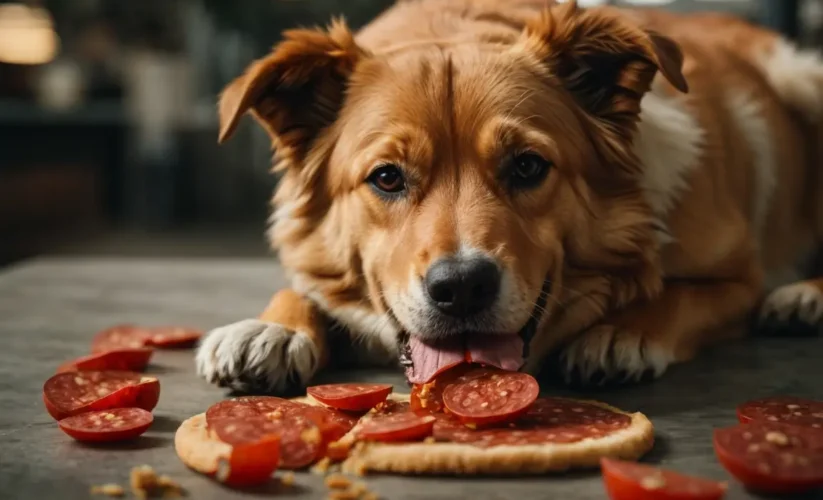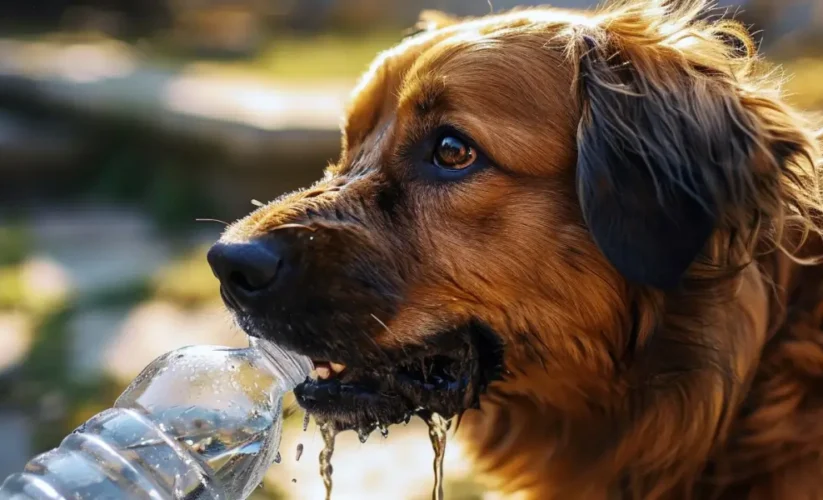Can dogs eat pepperoni?

Welcome, fellow dog lovers! Today, we’re diving into a question that has crossed the minds of many pet owners: “Can dogs eat pepperoni?” It’s a common scenario – you’re enjoying a slice of pepperoni pizza, and your furry friend is gazing up at you with those big, pleading eyes. The temptation to share a piece is real, but is it safe?
As a dedicated dog blogger and a dog parent myself, I understand the importance of ensuring our canine companions have a healthy and balanced diet. Our exploration into the world of pepperoni and dogs isn’t just about answering a yes or no question. It’s about understanding the nuances of canine nutrition and the impact of human foods on their health.
In this comprehensive guide, we’ll explore the potential benefits and risks of feeding pepperoni to dogs. We’ll delve into the ingredients of pepperoni, how it interacts with a dog’s digestive system, and the possible health implications. Our goal is to provide you with well-rounded knowledge to make informed decisions about your dog’s diet.
Is Pepperoni Good for Dogs?
When it comes to treating our furry friends, we often wonder if what’s on our plate is safe for them. Pepperoni, a popular pizza topping, is one such food that raises questions. This cured meat is a blend of pork, beef, and a variety of spices, including paprika and chili pepper, which makes it a flavorful choice for humans, but what about dogs?
Firstly, let’s consider the nutritional aspect of pepperoni. It’s high in protein, which is an essential component of a dog’s diet. Dogs need protein for muscle development, tissue repair, and overall growth. However, the type of protein in pepperoni is where concerns arise. This meat is processed and contains additives and preservatives, such as sodium nitrate, which are not recommended for canine consumption.
Another significant factor to consider is the spice content in pepperoni. While these spices make pepperoni a delicious treat for humans, they can be harmful to dogs. Spices like garlic and onion powder, which are often found in pepperoni, are toxic to dogs and can lead to gastrointestinal upset and even anemia in severe cases.
The fat content in pepperoni is also a cause for concern. Dogs do require fats in their diet, but the high levels of saturated fats in pepperoni can be problematic. Excessive fat intake can lead to pancreatitis in dogs, a painful and potentially dangerous condition. Symptoms of pancreatitis include vomiting, diarrhea, abdominal pain, and lethargy.
Furthermore, the high sodium content in pepperoni should not be overlooked. A diet high in sodium can lead to increased thirst and urination in dogs, and in extreme cases, it can cause sodium ion poisoning. Symptoms of too much sodium include vomiting, diarrhea, tremors, and seizures.
Additionally, the rich and fatty nature of pepperoni can lead to obesity in dogs if consumed regularly. Obesity in dogs is a growing concern and can lead to several health issues, including diabetes, heart disease, and joint problems.
While the occasional small piece of pepperoni might not cause immediate harm to a healthy dog, it’s not a recommended treat due to its potential health risks. When considering treats for your dog, it’s always best to choose options that are formulated specifically for their dietary needs, keeping in mind the balance of nutrients that is essential for their health and well-being.
Is Pepperoni Bad for Dogs?
The question of ‘Can dogs eat pepperoni?’ is more complex than a simple yes or no. As dog owners, we must delve into the specifics of pepperoni’s composition and how it aligns with canine health requirements.
Pepperoni is a cured meat typically made from a combination of beef and pork, and seasoned with a blend of spices such as garlic, paprika, and chili pepper. While it’s a flavorful delight for humans, the same cannot be confidently said for our canine companions. The primary concerns with feeding pepperoni to dogs revolve around its high fat and sodium content, as well as the presence of spices and additives that are potentially harmful to dogs.
High Fat Content
One of the most significant issues with pepperoni is its high fat content. While dogs do need fats in their diet for energy and to support cell function, the type and amount of fat in pepperoni are not ideal. The saturated fats in pepperoni can be difficult for dogs to digest and may lead to gastrointestinal upset. Symptoms like vomiting and diarrhea are common after a dog consumes high-fat foods. More seriously, regular consumption of fatty foods like pepperoni can lead to pancreatitis in dogs. Pancreatitis is an inflammation of the pancreas that can be painful and may require veterinary attention.
High Sodium Content
Another major concern is the sodium content in pepperoni. Dogs have a much lower tolerance for sodium than humans. Excessive salt intake can lead to increased thirst and urination, and in severe cases, sodium ion poisoning. Symptoms of too much sodium include vomiting, diarrhea, tremors, high fever, and seizures. Over time, high sodium intake can also contribute to high blood pressure and exacerbate heart conditions.
Spices and Additives
The spices used in pepperoni, such as garlic and onion powder, are toxic to dogs. These spices can cause gastrointestinal irritation and lead to red blood cell damage, resulting in anemia. Furthermore, pepperoni contains additives like preservatives (e.g., sodium nitrate) and flavor enhancers that are not suitable for dogs. These additives can cause various health issues, including allergic reactions and digestive problems.
Risk of Obesity
Regular consumption of high-calorie foods like pepperoni can contribute to obesity in dogs, raising the question, ‘Can dogs eat pepperoni?’ Obesity in dogs is a serious health concern and can lead to numerous problems, including diabetes, joint issues, and reduced lifespan. The calorie-dense nature of pepperoni, combined with its lack of essential nutrients, makes it a poor choice for a dog’s diet.
Digestive Issues
The rich and spicy nature of pepperoni can also cause digestive issues in dogs. Dogs have a more sensitive digestive system compared to humans, and the spices in pepperoni can cause upset stomachs, gas, and bloating. In some cases, it can lead to more severe gastrointestinal distress, necessitating a visit to the vet.
Alternatives to Pepperoni
Considering these risks associated with the question ‘Can dogs eat pepperoni,’ it’s advisable to avoid giving pepperoni to dogs. If you’re looking to treat your dog, opt for healthier alternatives. Lean meats like chicken, turkey, and certain cuts of beef, cooked without any added spices or seasonings, are much safer for dogs. There are also numerous dog treats available that are specifically formulated to be both safe and nutritionally beneficial for dogs.
Are Other Meats Safe For Dogs?
In contrast to pepperoni, there are several other meat options that are much safer and healthier for dogs. When considering alternative meats, it’s essential to focus on lean, unprocessed options. Chicken, turkey, beef, and fish are excellent protein sources for dogs when prepared simply, without added salt, spices, or preservatives.
Chicken and turkey, especially the lean breast meat, are low in fat and high in protein, making them a great option for dogs. It’s important to cook these meats thoroughly and ensure they are free from bones, as cooked bones can splinter and cause internal damage.
Beef, while higher in fat than poultry, can still be a healthy choice for dogs if you select lean cuts and cook them without added fat or seasonings. Fish, particularly salmon, is another fantastic source of protein and is rich in omega-3 fatty acids, which are beneficial for a dog’s coat and skin health.
When introducing new meats into your dog’s diet, it’s advisable to do so gradually. This allows their digestive system to adjust and helps identify any food sensitivities or allergies. Always consult with your veterinarian before making significant changes to your dog’s diet.
Final Thoughts
In conclusion, when it comes to the health and well-being of our canine companions, understanding the impact of our dietary choices on them is crucial. The question ‘Can dogs eat pepperoni?’ brings to light the broader issue of feeding human foods to pets. While the temptation to share our snacks with our furry friends is understandable, it’s essential to prioritize their health and nutritional needs over the momentary pleasure of sharing.
Pepperoni, with its high fat and sodium content, spices, and additives, is clearly not an ideal choice for dogs. The risks associated with feeding pepperoni to dogs – ranging from digestive upset to serious health conditions like pancreatitis and sodium ion poisoning – outweigh the benefits. Furthermore, the potential for contributing to obesity and related health issues is a significant concern.
As responsible pet owners, our goal should be to provide a diet that ensures the longevity and vitality of our pets. This means opting for dog-friendly foods that are specifically formulated to meet their nutritional requirements. There are plenty of healthy and safe alternatives to pepperoni and other processed meats. Lean, cooked meats without added spices or seasonings, as well as commercially available dog treats that are made with canine health in mind, are excellent choices.
It’s also important to remember that treats should only make up a small portion of a dog’s diet. The primary focus should be on high-quality commercial dog food that provides balanced nutrition. Always consult with a veterinarian when making changes to your dog’s diet or if you have concerns about what foods are safe for them.
In essence, while sharing our food with our dogs is a way to show love and bond with them, it’s vital to do so in a way that doesn’t compromise their health. Making informed choices about our dog’s diet is one of the many ways we can ensure they lead a happy, healthy, and fulfilling life.










